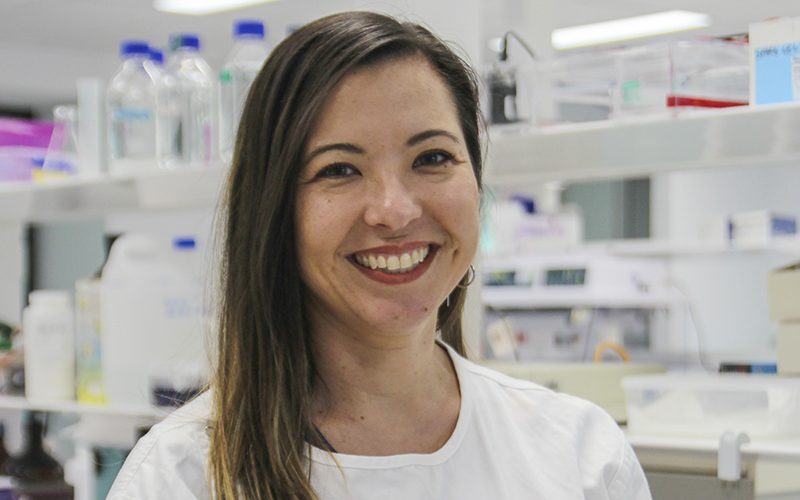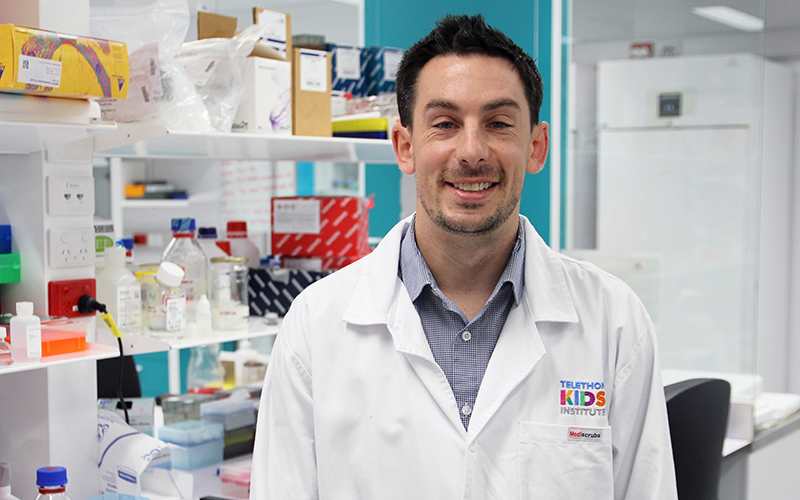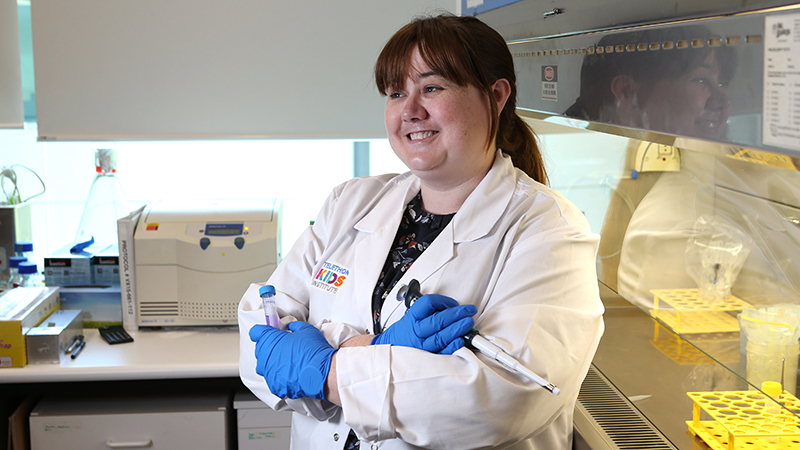Search

News & Events
Cancer Council WA supports development of less toxic treatments for childhood brain cancerThe Kids Research Institute Australia researcher, Dr Raelene Endersby, will work to develop less toxic treatments for children with brain cancer, thanks to support from Cancer Council WA.

News & Events
The Kids Research Institute Australia Cancer Centre Researcher wins Cancer Council WA FellowshipCancer Council WA has awarded a Post-Doctoral Fellowship to Dr Ben Wylie, for his project to help kids with sarcoma.

News & Events
“Natural killer” donor cells fighting kids leukaemiaNew research by The Kids shows donor immune cells are highly effective at boosting the body’s response against leukaemia.
Research
Delivery of PEGylated liposomal doxorubicin by bispecific antibodies improves treatment in models of high-risk childhood leukemiaHigh-risk childhood leukemia has a poor prognosis because of treatment failure and toxic side effects of therapy. Drug encapsulation into liposomal nanocarriers has shown clinical success at improving biodistribution and tolerability of chemotherapy. However, enhancements in drug efficacy have been limited because of a lack of selectivity of the liposomal formulations for the cancer cells.
Research
BRAF-mediated brain tumors in adults and children: A review and the Australian and New Zealand experienceThe mitogen-activated protein kinase (MAPK) pathway signaling pathway is one of the most commonly mutated pathways in human cancers. In particular, BRAF alterations result in constitutive activation of the rapidly accelerating fibrosarcoma-extracellular signal-regulated kinase-MAPK significant pathway, leading to cellular proliferation, survival, and dedifferentiation.
Research
Editorial: Bench to bedside: translating pre-clinical research into clinical trials for childhood brain tumorsNick Raelene Gottardo Endersby MBChB FRACP PhD BSc (Hons) PhD Head of Paediatric and Adolescent Oncology and Haematology, Perth Children’s Hospital;
Research
Implementation of DNA Methylation Array Profiling in Pediatric Central Nervous System Tumors: The AIM BRAIN Project: An Australian and New Zealand Children's Haematology/Oncology Group StudyDNA methylation array profiling for classifying pediatric central nervous system (CNS) tumors is a valuable adjunct to histopathology. However, unbiased prospective and interlaboratory validation studies have been lacking. The AIM BRAIN diagnostic trial involving 11 pediatric cancer centers in Australia and New Zealand.
Research
Veliparib Is an Effective Radiosensitizing Agent in a Preclinical Model of MedulloblastomaMedulloblastoma is the most common malignant childhood brain tumor, and 5-year overall survival rates are as low as 40% depending on molecular subtype, with new therapies critically important. As radiotherapy and chemotherapy act through the induction of DNA damage, the sensitization of cancer cells through the inhibition of DNA damage repair pathways is a potential therapeutic strategy.
Research
Systems pharmacogenomics identifies novel targets and clinically actionable therapeutics for medulloblastomaMedulloblastoma is the most common malignant paediatric brain tumour and a leading cause of cancer-related mortality and morbidity. Existing treatment protocols are aggressive in nature resulting in significant neurological, intellectual and physical disabilities for the children undergoing treatment. Thus, there is an urgent need for improved, targeted therapies that minimize these harmful side effects.
Research
Case Report: Long-Term Survival of a Pediatric Patient With an Intra-Abdominal Undifferentiated Carcinoma of Unknown PrimaryThis report provides detailed characterization of carcinoma of unknown primary (CUP) in a young child and in the absence of defined therapeutic guidelines for pediatric CUP, the successful treatment strategy described should be considered for similar cases.
